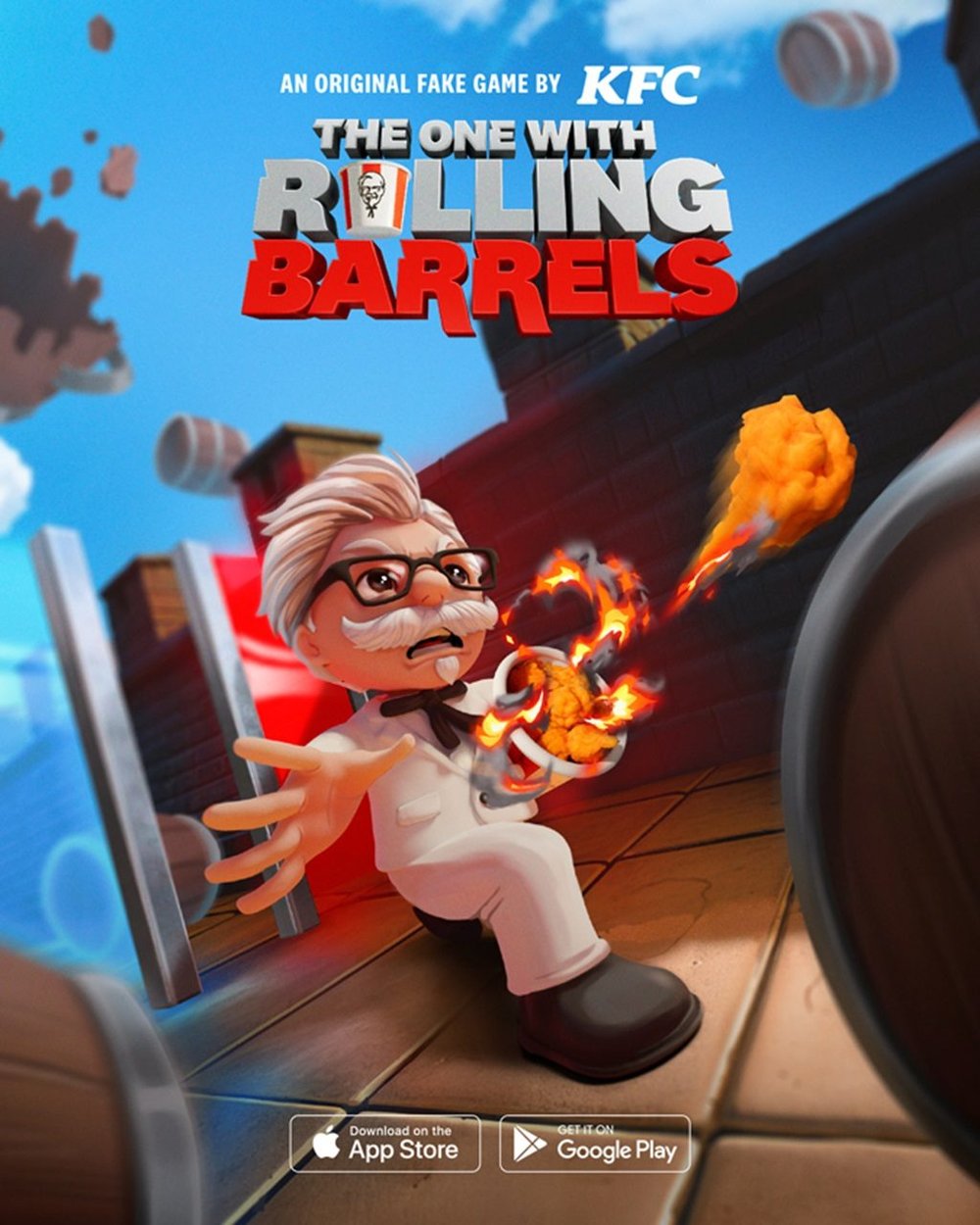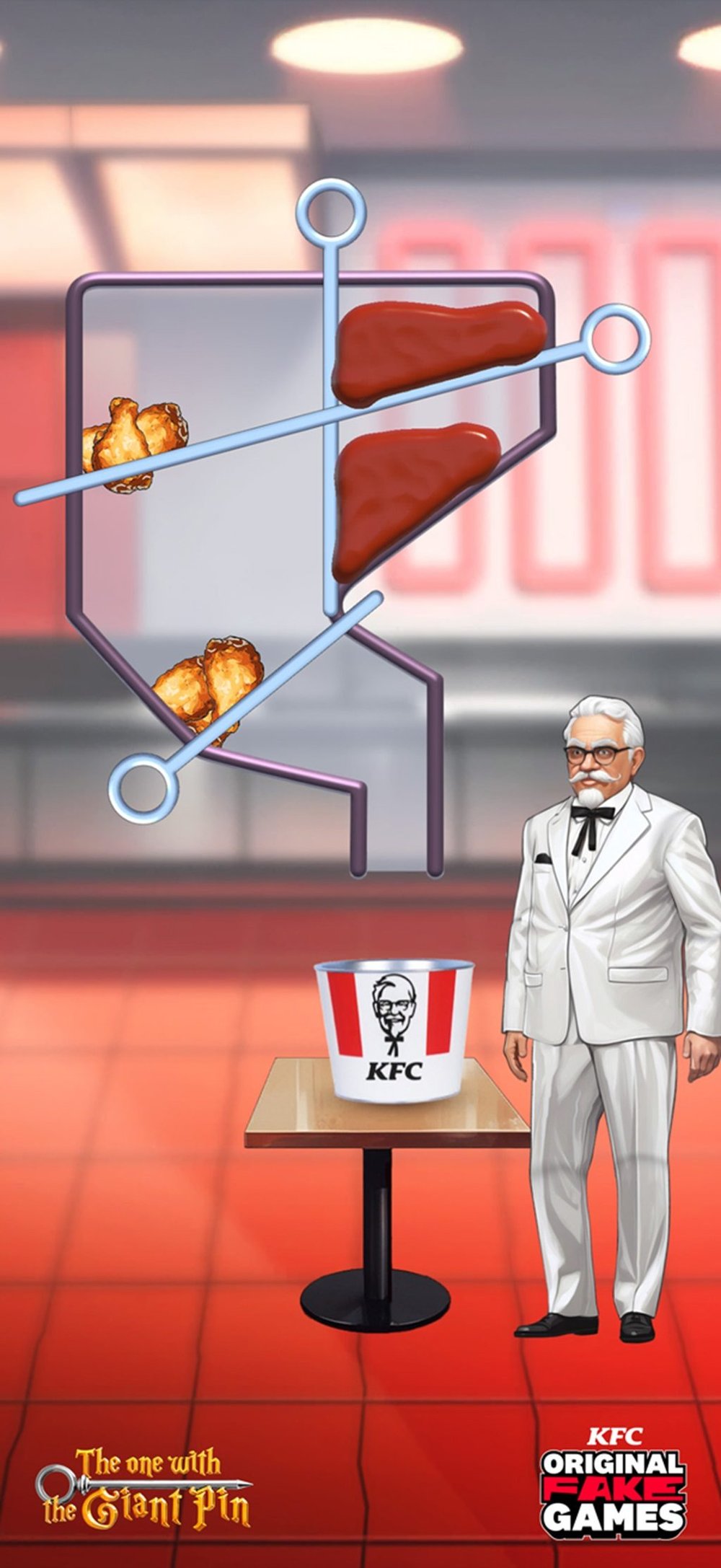Campaign of the Week
KFC turns misleading game ads into playable originals for UAE gamers /
Fast food brand turns fake mobile game ads into real titles to appeal to gamers in the UAE
For years, mobile gaming companies have been creating misleading advertising for their app-based video games – drawing people in with seemingly exciting, dynamic and realistic gameplay that the actual game looks nothing like. To appeal to gamers in the region, in March 2025, KFC United Arab Emirates has made these fake games for real – releasing the four free-to-play titles called KFC Original Fake Games.
The on-the-nose names of the games are inspired by the common stylistic tropes seen among the most infamous fake mobile games, such as The One with the Giant Pin, The One with the Rolling Barrels, The Trapped King One and The Weird Tennis One. Although there are four games total, all are contained within one central app that is free to download and play from the Apple App Store or on Google Play.

In The One with the Giant Pin, players must remove various pins to combine KFC fried chicken with gravy or uncooked chicken breast with oil to then land in a KFC bargain bucket being held a aloft by a cartoon Colonel Sanders. In another, The Trapped King One, across three levels the player is against the clock to save Colonel Sanders from a sea snake, a lava pit and an acid-breathing snowman by matching identical burger, fries and cola symbols in a grid.
The games offer between five and 15 minutes of gameplay with a global leaderboard encouraging increased engagement.
The campaign was created in partnership with TBWA\RAAD, Dubai, and production company Eterna Software.
The games were promoted via online programmatic ads – styled after the different fake game styles – targeting gamers after they had been served one of the classic fake game ads online with the call to action: ‘Download the game you just saw in the previous fake ad.’ The brand also partnered with Saudi Arabian gaming influencer Meshael to play and review the titles.

Results / KFC told Contagious that following the launch phase, which lasted a little over a week, downloads of the games were 300% above what was expected by the brand. KFC also report that a recent survey by the brand places KFC as the number one QSR with the gaming target audience.
Contagious Insight /
It’s in the game / For brands, gamers represent a massive, engaged audience with high purchasing power and fierce loyalty – just one problem, they are an exceedingly savvy audience highly allergic to anything that feels too much like a sell. They don’t want they game interrupted either. If you want to get gamers… you have to get gamers. Over the last few years, KFC has shown how with the likes of KFConsole, Recipe Run and I Love You, Colonel Sanders! A Finger Lickin’ Good Dating Simulator.
While KFC’s Original Fake Games are not going to win a mobile game of the year award any time soon, they serve up a knowing bit of fun for gamers who have routinely been teased by clickbait adverts. The strategy recognises that gamers are discerning consumers who value genuine experiences over forced brand integration. By delivering on the promise of fun and unpredictability that the fake ads often fail to provide, KFC proves again it is not a brand merely adjacent to gaming – it is an active and appreciated participant.
Ahmed Arafa, CMO at KFC’s parent company Yum, said in a statement, ‘We’re not just sponsoring or advertising; we’re offering something genuinely fun and unexpected that naturally fits into the gaming experience. Part of our strategy is to find unique and disruptive gaming ideas that will allow us to not only win but dominate in the gaming space.’
To see more examples of the best of gaming in advertising, check out our handy collection here.
Fake it, make it / KFC’s Original Fake Games campaign is so compelling because it taps into the viral trend of fake game ads – these ads are everywhere, often mocked, and widely recognised. By recreating them, KFC instantly grabs attention and turns the frustration of fake ads into a fun, shareable experience. It’s a smart, funny insight, and lets KFC turn a negative consumer experience into a positive brand interaction – one that will resonate with its target audience.
As Joe Lahham, managing director at TBWA\RAAD, said in a statement: ‘This campaign flips a frustrating consumer experience on its head. We’ve taken the disappointment of fake ads and turned it into a moment of delight, proving once again that pushing creative boundaries leads to memorable brand experiences.’
The idea of a fast-food brand making real games from fake ads is so fresh that it naturally gets people talking on social media and in the news. KFC isn’t just interrupting consumers with an ad; it is joining a pre-existing conversation and offering a surprisingly satisfying and entertaining contribution.
Want more of the same? /
We don’t just write about best-in-class campaigns, interviews and trends. Our Members also receive access to briefings, online training, webinars, live events and much more.







